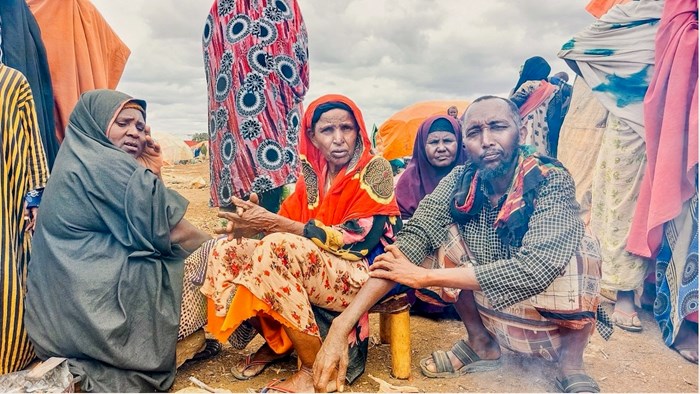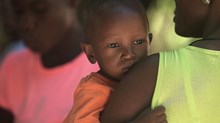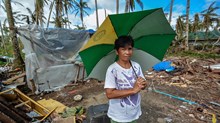We Dare Not Look Away from the Urgent Situation in Somalia

I recently served a six-month deployment in emergency communications for World Vision in Somalia, and nothing could have prepared me for the real-life emergency unfolding before my eyes.
In Somalia, the cycle of disasters—natural and manmade—has been going on for decades. Now, more than 7 million Somalis need lifesaving aid to prevent another famine.
Traveling in most of Somalia is not easy. Not even a ride in a 4X4 vehicle will guarantee a timely and safe arrival to your destination. Most of the roads were bumpy, dusty, and thickly dotted with dense, gray tufts of desert shrubs as we headed to the hard-to-reach areas to deliver lifesaving aid to the most vulnerable. On those trips, I encountered stories that sent me on an emotional roller coaster ride.
Eyes of hunger
As famine knocks on Somalia’s door, children are most affected and at the highest risk of malnutrition, starvation, and death.
Fadumo Mohammed, 2, was admitted to the Bay Regional Hospital in Baidoa in critical condition. She was in shock because of hypoperfusion. Her body organs were simply not receiving enough blood because of a lack of nutritious food. As I looked at her wasted body, my heart was broken. There was thunder in my thoughts, despair coursing through my blood, and a numbness clouding my eyes.
Too weak to move, she could only roll her eyes, which looked like they were almost falling out of her eye sockets. Quietly, she stared. I turned to look away, and my eyes met a line-up of beds, all occupied with children in the same (if not worse) state. The hospital was overcrowded, with pints of blood hanging from the posts of most beds and medical machines beeping from every inch and corner.
With the help of a local journalist, we talked to one of the mothers who had a child in the hospital about their dire situation and where they had come from. Her words shook me. “We’re lucky to have made it (to Baidoa),” she said as she described the desperation among families who were fighting to survive.
My job was to broadcast the drought emergency, get vital information to the people who needed it most, and raise awareness of the crisis unfolding in Somalia through media content.
There would be more stories of desperation. Hunger is cruel, manifesting so strongly, and I saw it unfolding right before my eyes.
Dahabo’s dilemma
Drought and food insecurity forced Dahabo Ali, 70, and her children to flee their farm in Dinsoor District, a town in the southwestern Bay region of Somalia. They left their community after hunger became unbearable. The rains had failed for another season, and they lost everything, including their livestock. To stay in Diinsoor was to stare at death.
With little energy left, they risked it all and trekked for three days to Baidoa, about 70 miles. They ended up joining other groups of people on the move in search of food, water, and shelter. A mass migration ensued to Baidoa. Dahabo’s eldest son said he witnessed three people, two females and a man, perishing on the way because of hunger. They were not accorded a decent burial. Dahabo also saw a woman giving birth on the side of the road.
She and her children are now settled in a camp for displaced people, hoping to get humanitarian aid. So far, no help has arrived, but Dahabo says it's better there than back home. Her sons can go and collect firewood and sell and buy beans, which they are able to eat once a day.
Baidoa is receiving an influx of displaced people from surrounding districts, all forced to migrate because of conflict and rising food insecurity. This migration reminds me how Jacob sent his children to Egypt at a time of drought.
Now when Jacob saw that there was corn in Egypt, Jacob said unto his sons, “Why do you look one upon another?” And he said, “Behold I have heard that there’s corn in Egypt: get you down thither, and buy for us from thence; that we may live, and not die.” Genesis 40:1-2
“Egypt” represents a place of bondage and captivity, but it always has better promise in contrast to the current situation. It is not a usual desire for parents to send their family into captivity, but hunger might make them do so.
Today, desperate parents may deny their children stepping foot in a classroom, send their underaged daughters into arranged marriages to ease the family’s financial burden, or encourage their children to go in the streets to clean and polish shoes to bring home food.
Giving leads to provision
Feeding the hungry was a theologically significant miracle in the ministry of Jesus. And He knows how it feels to be hungry. Feeding the hungry and hearkening to the needs of the poor and vulnerable are core demands of Christianity.
In 2 Kings 4:42-44, we read of Elisha feeding hundreds of disciples with the first fruits he had received from the people according to the law of Leviticus.
A man came from Baal Shalishah, bringing the man of God twenty loaves of barley bread baked from the first ripe grain, along with some heads of new grain. “Give it to the people to eat,” Elisha said. “How can I set this before a hundred men?” his servant asked. But Elisha answered, “Give it to the people to eat. For this is what the Lord says: ‘They will eat and have some left over.’” Then he set it before them, and they ate and had some left over, according to the word of the Lord.
When the man from Baal Shalishah brought his gifts to Elisha, the prophet asked that it be given to the needy disciples, but his servant observed that the bread was not enough for 100 men. The prophet insisted. Understanding the scripture “they will eat and have some left over,” the servant did as Elisha instructed. When the disciples ate, indeed they were full and had leftovers.
Drought and hunger are not new; from the above scriptures, we see they are ancient. They’re a tool the enemy has mastered, and not even Jesus was spared.
The best way to defeat the prince of darkness is with light. During these hard times, the enemy manifests strongly, but we can have victory over him, just as Jesus did. Let us use the light we have to defeat him.
The light is Jesus, and His commandment is to love. When we love, we give: “For God so loved the world that he gave” and “Jesus had compassion on the crowd and fed them.”
From the above verses and the ministry of Jesus, we see that as Christians, we need to make steps of faith through giving, instead of doing nothing.
We dare not look away from the situation in Somalia.
If we move by faith and share the little we have, the grace of God will engulf the effort. God does not despise our imperfect efforts, or see them as insignificant. He works collaboratively, by taking our gifts—and blessing them to increase.
Gwayi Patrick is an emergency communications specialist for World Vision in Somalia. Before joining World Vision, he worked at a local TV station in Kenya. He sees many opportunities to serve God in Somalia and is grateful God planted him there. Besides work, Gwayi is passionate about traveling, sports, and service to others.
The Better Samaritan is a part of CT's
Blog Forum. Support the work of CT.
Subscribe and get one year free.
The views of the blogger do not necessarily reflect those of Christianity Today.





















